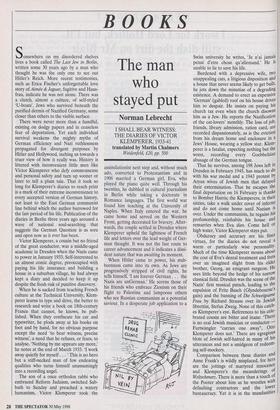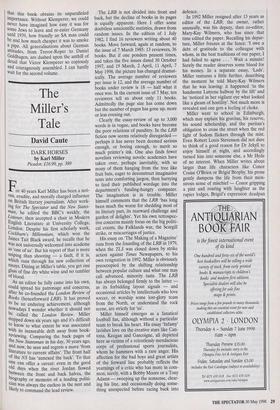BOOKS
The man who stayed put
Norman Lebrecht
I SHALL BEAR WITNESS: THE DIARIES OF VICTOR KLEMPERER, 1933-41 translated by Martin Chalmers Weidenfeld, £20, pp. 500 Somewhere on my disordered shelves lives a book called The Last Jew in Berlin, written some 30 years ago by a man who thought he was the only one to see out Hitler's Reich. More recent testimonies, such as Erica Fischer's unforgettable love story of Aimee & Jaguar, fugitive and Haus- frau, indicate he was not alone. There was a clutch, almost a culture, of self-styled `U-boats', Jews who survived beneath the purified dermis of Nazified Germany, some closer than others to the visible surface.
There were never more than a handful, existing on dodgy papers and in ceaseless fear of deportation. Yet each individual survival weakens the mighty myths of German efficiency and Nazi ruthlessness propagated for divergent purposes by Hitler and Hollywood, inching us towards a truer view of how it really was. History is littered with inconvenient little men like Victor Klemperer who defy commonsense and personal safety and turn up sooner or later to tell a plain tale. That it took so long for Klemperer's diaries to reach print is a mark of their extreme inconvenience to every accepted version of German history, not least to the East German communist line behind which the author burrowed for the last period of his life. Publication of the diaries in Berlin three years ago aroused a wave of national soul-searching that suggests the German Question is as sore and open now as it ever has been.
Victor Klemperer, a cousin but no friend of the great conductor, was a middle-aged academic in Dresden when the Nazis came to power in January 1933. Self-interested to an almost comic degree, preoccupied with paying his life insurance and building a house in a suburban village, he had always kept a diary and decided to keep it up despite the fresh risk of punitive discovery.
When he is sacked from teaching French culture at the Technical University, Klem- perer learns to type and drive, the better to research and write a book on 18th-century France that cannot, he knows, be pub- lished. When they confiscate his car and typewriter, he plods away at his books on foot and by hand, for no obvious purpose except the need 'to bear witness, precise witness', a need that he refuses, or fears, to analyse. 'Nothing by me appears any more,' he notes at the end of March 1933. 'I work away quietly for myself . . . ' This is no hero but a stiff-necked man of few endearing qualities who turns himself unassumingly into a recording angel.
The son of a once orthodox rabbi who embraced Reform Judaism, switched Sab- bath to Sunday and preached a watery humanism, Victor Klemperer took the assimilationist next step and, without much ado, converted to Protestantism and in 1906 married a German girl, Eva, who played the piano quite well. Through his twenties, he dabbled in cultural journalism in Berlin while taking a doctorate in Romance languages. The first world war found him teaching at the University of Naples. When Italy entered the war, he came home and served on the Western Front, getting decorated for bravery. After- wards, the couple settled in Dresden where Klemperer upheld the lightness of French life and letters over the lead weight of Ger- man thought. It was not the fast route to career advancement and it indicates a dissi- dent nature that was awaiting its moment.
When Hitler came to power, his stub- bornness came into its own, As Jews are progressively stripped of civil rights, he tells himself, 'I am forever German . . . the Nazis are unGerman.' He scorns those of his friends who embrace Zionism on their flight to Palestine and lampoons others who see Russian communism as a potential saviour. In a desperate job application to a Swiss university he writes, `Je n'ai jamais pense d'etre chose qu'allemand.' He Is unable to lie to save his life.
Burdened with a depressive wife, two unappealing cats, a litigious disposition and a house that never seems likely to get built, he jots down the minutiae of a degrading existence. A demand to erect an expensive `German' (gabled) roof on his house drives him to despair. He insists on paying his church tax even when the church disowns him as a Jew. He reports the Nazification of the cat-lovers' monthly. The loss of job, friends, library admission, ration card, are recorded dispassionately, as is the eviction from his dream home and enclosure in a Jews' House, wearing a yellow star. Klem- perer is a fatalist, expecting nothing but the worst, recording every Goebbelsian abusage of the German tongue. That he survives, among 198 Jews left in Dresden in February 1945, has much to do with his war medal and a 1943 protest by Aryan wives of Jewish men that delayed their extermination. That he escapes the final deportation on 16 February is thanks to Bomber Harris; the Klemperers, in their sixties, take a walk under cover of inferno and do not come home until Nazism is over. Under the communists, he regains his professorship, reinhabits his house and remarries when Eva dies. Come hell or high water, Victor Klemperer stays put.
Obduracy and accuracy are his finer virtues, for the diaries do not reveal a warm or particularly wise personalitY. Much of the time Klemperer moans about the cost of Eva's dental treatment and frets over an imagined slight from his elder brother, Georg, an emigrant surgeon. He sees little beyond the hedge of his narrow classical field. Dresden was the scene of the Nazis' first musical putsch, leading to the expulsion of Fritz Busch (Glyndebourne s gain) and the banning of Die Schweigsame Frau by Richard Strauss over its Jewish librettist, Stefan Zweig. None of this catch- es Klemperer's eye. References to his cele- brated cousin are bitter and inane: 'There is no real Jewish musician or conductor — Furtwangler "carries one away", Otto Klemperer does not.' There are egregious blots of Jewish self-hatred in many of Ills utterances and not a smidgeon of redeem- ing self-mockery. Comparison between these diaries and Anne Frank's is wildly misplaced, for hers are the jottings of martyred innocence and Klemperer's the meanderings of Weltschmetz. There is more than a touch of the Pooter about him as he wrestles with defaulting contractors and the lower bureaucracy. Yet it is in the mundamties that this book obtains its unparalleled Importance. Without Klemperer, we could never have imagined how easy it was for some Jews to leave and re-enter Germany until 1939, how friendly an SA man could be and how much cheaper it was to smoke a pipe. All generalisations about German attitudes, from Trevor-Roper to Daniel Goldhagen, are dashed upon the anthill of detail that Victor Klemperer so copiously and courageously assembled. I can hardly wait for the second volume.



































































 Previous page
Previous page